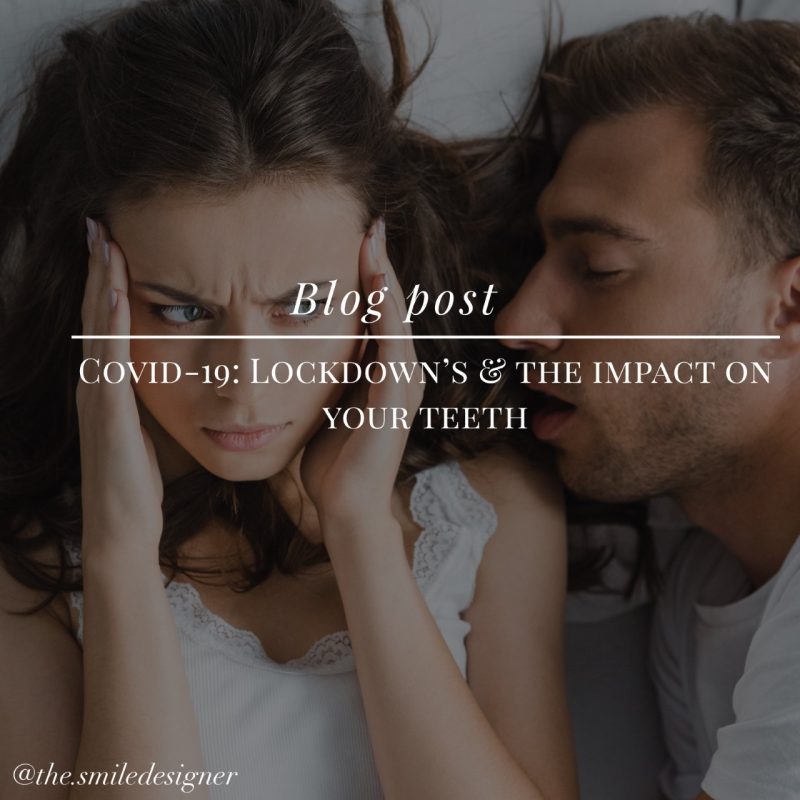Uncategorized
COVID-19: Lockdown’s and the impact on your teeth
With Victoria being in six lockdowns, it’s no secret that 2020 and 2021 have been turbulent and challenging two years in so many ways.
So many Australian businesses have been forced to shut their doors or reduce typical trading hours and find new covid norms in keeping businesses afloat. Dental practices during this time have also been struggling to keep their head above water and temporarily reduce the number of patients seen. Victorian dentists have been providing dental care to patients who display urgent needs and providing care and treatment to those in a clinically appropriate timeframe preventing any adverse outcomes.
The last 12-18 months have been turbulent and busy simultaneously, with no signs of slowing down. During this pandemic, we have noticed that more patients are coming to us with broken and cracked teeth, inflamed and bleeding gums, and headaches than ever before.
You may be wondering how is this all linked and why is this the case?
Since the coronavirus pandemic began, we’ve put it down to the following three things that have caused this increase
- Stress
- Working from home
- Poor sleep
The good news is that with any of the above three issues that may affect your teeth, once identified, it is easy to implement routine and changes to your lifestyle to prevent further damage.
01
Stress
Several lockdowns and the uncertainty of not escaping from them have led to increased pressure and fear during this time. They have no doubt impacted everyone’s mental health, causing stress levels to be higher than ever before.
This pandemic has not gone away overnight, nor will it go away overnight, so it’s essential to understand how to implement and manage stress during these challenging times. Long-term stress is proven to weaken the immune system. With higher cortisone levels, the body’s ability to fight infection decreases and increases oral health issues such as inflamed gums and bleeding. Changes to gums can lead to periodontal gum disease if left untreated.
Stress can also lead to Bruxism, a subconscious tendency to clenching and grinding your teeth when you are asleep. This can lead to headaches, jaw pain, and unnecessary strain. Not only can this increase the risk of breaking or fracturing your teeth, but it can also cause enamel erosion.
Solution:
Meditation and exercise are both great ways to relieve stress. Connecting your mind to a meditative routine will help boost your mental health and bring better clarity; with many apps available, it is easy to implement during your lunch break, first thing in the morning, or even before bed. Being physically active, whether it’s just going for a walk in fresh air daily, is an effective way to boost your mental health, reduce stress and release those endorphins. Having somebody to talk to who may be going through the same situation is also a great outlet. Having an accountability partner can help you feel much better by checking in on each other.
02
Working from Home
With so many lockdowns, the shutdown of economies, and maintaining social distancing during this pandemic has increased millions of people working from home.
Working from home has become the new norm that most were not prepared for, making this both mentally challenging and physically. With regular work commutes ceased and lunch break socializing not in the picture, people have reported that having a home office setup has led them to work longer hours than usual. Not only has it created longer hours, but the arrangements may not be the most ergonomically ideal for one’s posture, whether it be at the kitchen table or hunched over on the couch.
Poor posture throughout the day can lead to TMJ disorder and teeth grinding at night. When sitting for long periods, not in the proper posture, the head can become out of alignment with the spine, causing the chin to thrust forward and knocking the jaw joint out of alignment as well.
This can further lead to jaw pain, clenching, or even broken teeth, as these jaw muscles are closely linked and can also impact their function.
What you can do:
It is essential to create awareness of your environment and set up your home office. Ensuring you have a good setup separate from any other areas such as the kitchen, the lounge would be ideal as this will help create segregation when needing time away from your home office. Being aware of your posture and ensuring your shoulders are over your hips and ears aligned with your shoulders. Create an ergonomically friendly home office and ensure you have invested in a good chair as well as having your screen at eye level. Keeping a diary can also help create a routine and ensure that you take breaks and integrate stretches and movement exercises were needed to help improve your muscles.
03
Poor Sleep
Combined with stress and uncertainty with times like this have increased insomnia and restlessness at bedtime. Naturally, our human bodies go into a “flight or fight” response when we are in a state of increased stress, therefore, making it challenging to unwind before bed.
What you can do:
Most of us thrive on routine, and the best thing to do is to create a bedtime routine that best suits you that will help you switch off. Poor sleep has been associated with many health problems, and it’s essential to incorporate some time aside to help you unwind to get a better night’s sleep. Switching off any screen time an hour before bed is a great way to help reduce mind stimulation and start the process of helping your mind unwind and get ready for bed. Pairing that up by taking a bath and incorporating some deep breathing exercises can help activate the parasympathetic nervous system helping slow down your heart rate to improve quality sleep. When you are less stressed, you will have a better sleep. Your body will be more relaxed, meaning you will reduce and minimize tensions when you wake up, therefore helping any clenching and grinding when sleeping.
Most of us don’t know we clench or grind at night unless it becomes chronic. To avoid that, it’s essential to become aware of it. Whilst reading this, if your teeth are touching, that’s a sign that you may be causing some damage as in a relaxed state, your teeth are not meant to be touching aside form when you are talking and chewing. At a resting state when your mouth is relaxed, there should be a small gap between your upper and lower teeth when your lips are pressed together.
Preventing your teeth from clenching and grinding will give your teeth and smile longevity. Slight tiny imperfections and cracks caused by everyday wear and tear can lead to more severe trauma and further treatments such as crowns, veneers, root canals. Prevention is the best cure without breaking your bank to something that can be avoided.
The Smile Designer dental is here to help. We want to ensure that your oral health is at its best and advise you whether you have any dental issues at our six-monthly check-up and cleans. We may advise you to create a customized nightguard to prevent the consequences of grinding and clenching so that your teeth are kept in their best shape possible!































